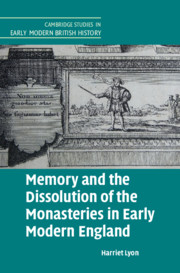Book contents
- Memory and the Dissolution of the Monasteries in Early Modern England
- Cambridge Studies in Early Modern British History
- Memory and the Dissolution of the Monasteries in Early Modern England
- Copyright page
- Dedication
- Contents
- Figures
- Acknowledgements
- Note on the Text
- Abbreviations
- Introduction
- Chapter 1 ‘No News but the Abbeys Shall Be Down’
- Chapter 2 ‘Worthy of Lasting Memory’
- Chapter 3 ‘Raised Out of the Ruins’
- Chapter 4 ‘Many Pretty Odd Tales’
- Conclusion
- Bibliography
- Index
Chapter 4 - ‘Many Pretty Odd Tales’
Monks, Monasteries, and the Sin of Sacrilege in Local Tradition
Published online by Cambridge University Press: 08 October 2021
- Memory and the Dissolution of the Monasteries in Early Modern England
- Cambridge Studies in Early Modern British History
- Memory and the Dissolution of the Monasteries in Early Modern England
- Copyright page
- Dedication
- Contents
- Figures
- Acknowledgements
- Note on the Text
- Abbreviations
- Introduction
- Chapter 1 ‘No News but the Abbeys Shall Be Down’
- Chapter 2 ‘Worthy of Lasting Memory’
- Chapter 3 ‘Raised Out of the Ruins’
- Chapter 4 ‘Many Pretty Odd Tales’
- Conclusion
- Bibliography
- Index
Summary
This chapter turns to the memory of the dissolution in the communities that had been built around monasteries and in the families who occupied them. In order to access the local and oral dimensions of this memory culture, it uses antiquarian writing to throw a sidelight onto the traditions and stories that antiquaries encountered as they traversed the country. This chapter suggests that the key concept to unlocking this memory culture is sacrilege. Stories of ghostly hauntings and strange happenings preoccupied local people living in or near former monastic places. It has sometimes been suggested that English Protestantism was hostile to oral and local cultures, but this chapter argues that, far from being the harbinger of their decline, the Reformation in fact generated and invigorated local traditions. By exploring sacrilege narratives connected to the dissolution, this chapter also makes a case for the vibrancy and longevity of local memory cultures across the seventeenth century and into the early eighteenth century and beyond. In doing so, it seeks to erode and collapse the distinctions between ‘popular’ and ‘learned’, ‘local’ and ‘national’ cultures of history and memory that continue to influence scholarship on early modern historical consciousness
- Type
- Chapter
- Information
- Publisher: Cambridge University PressPrint publication year: 2021

